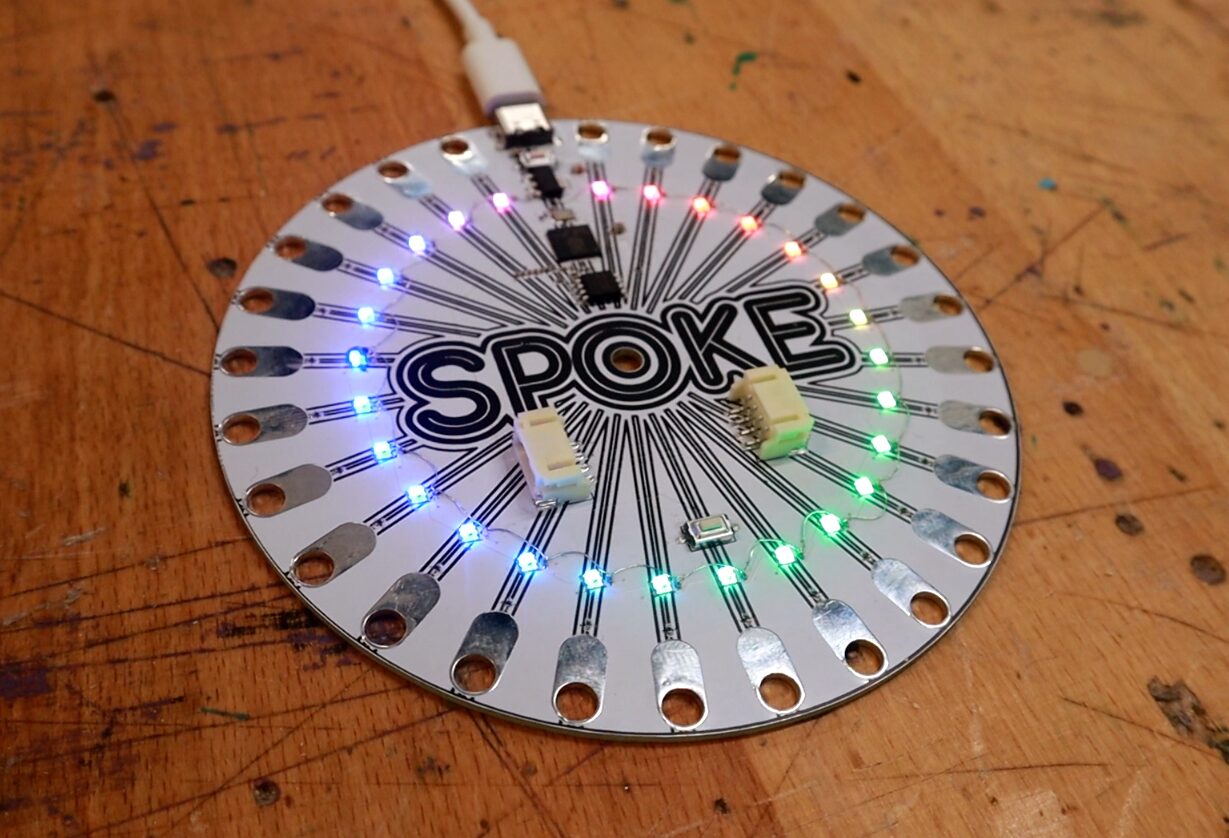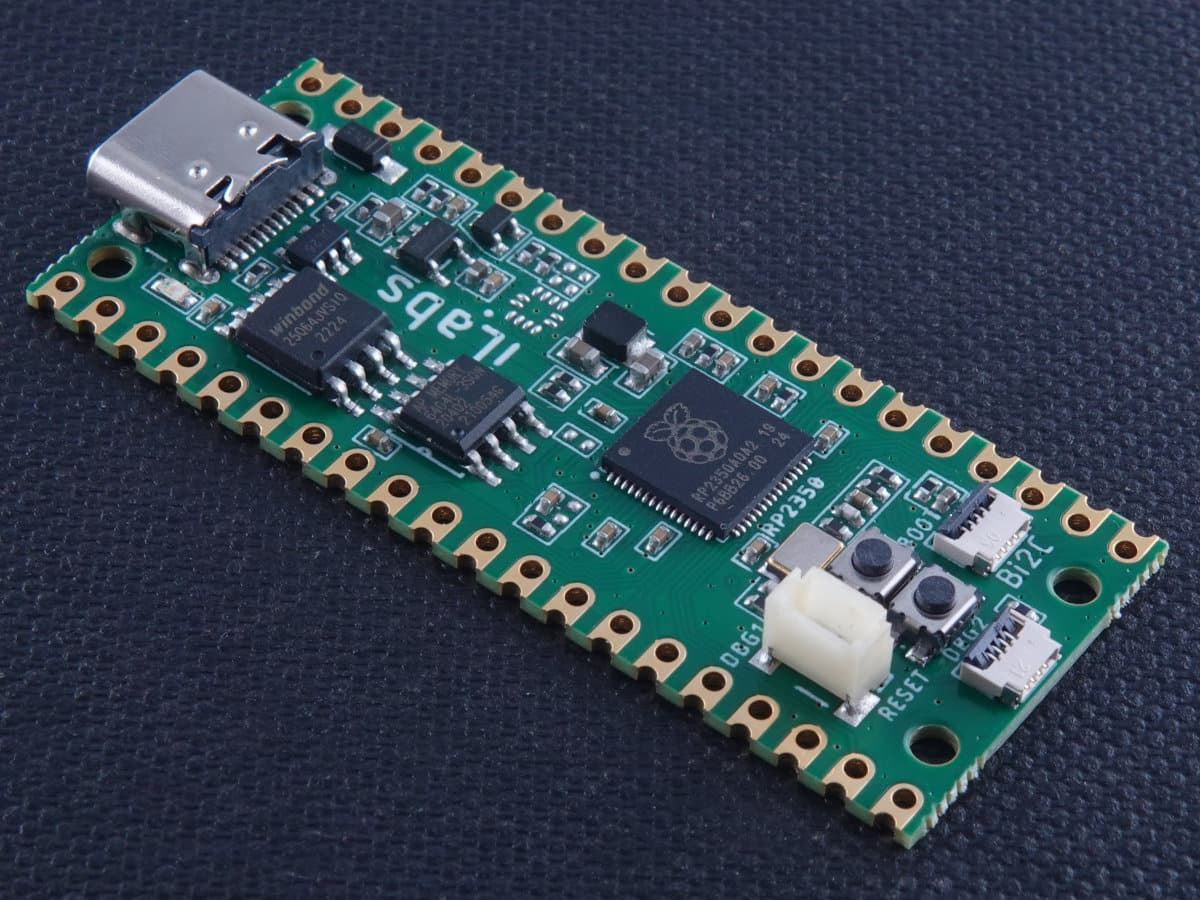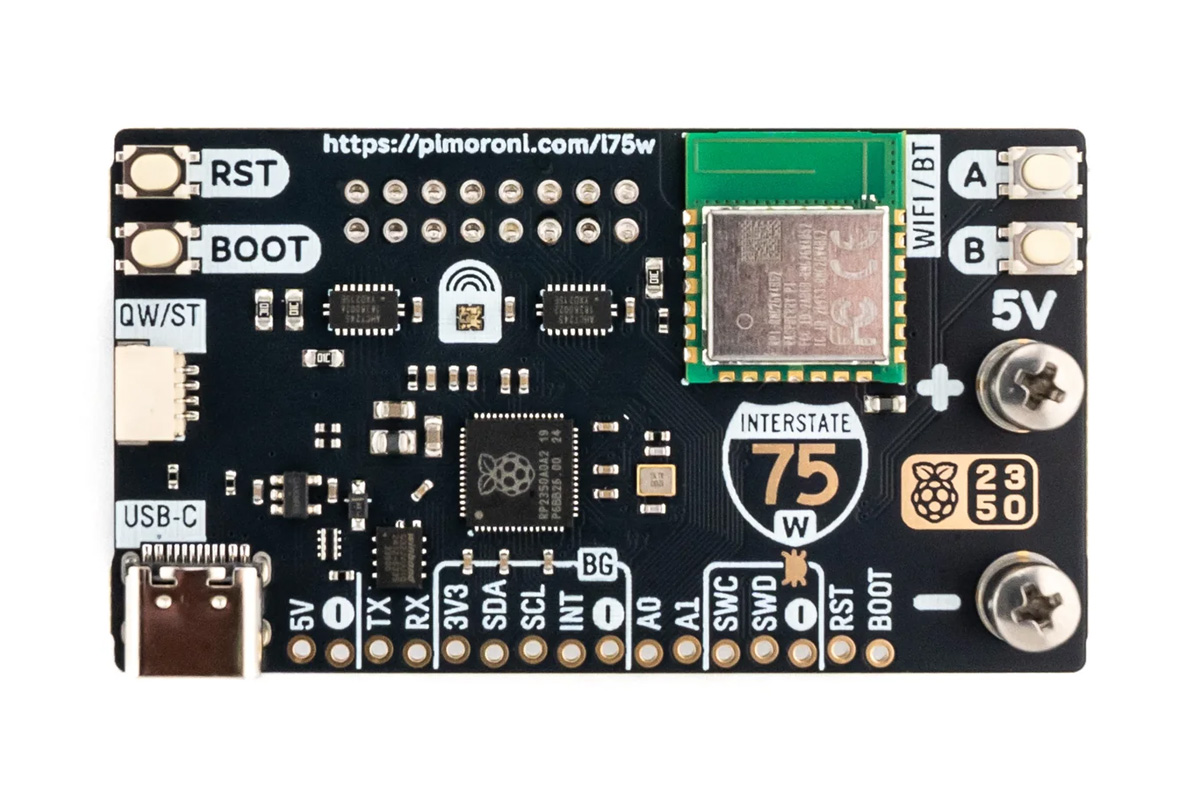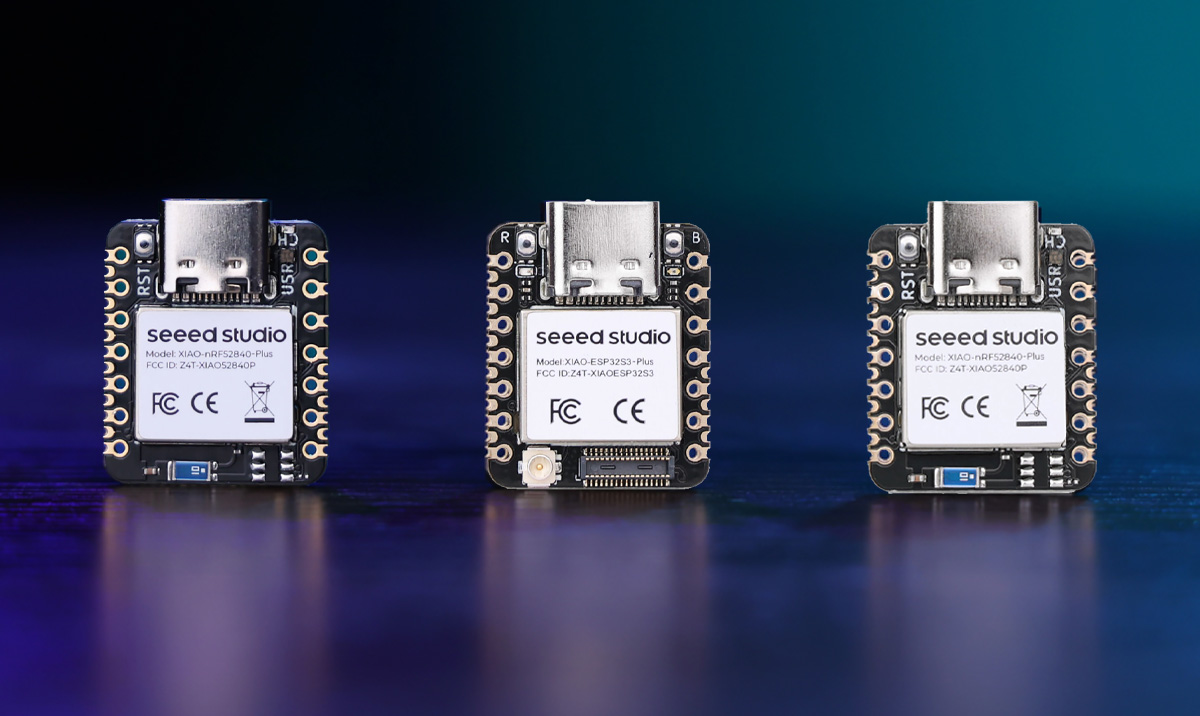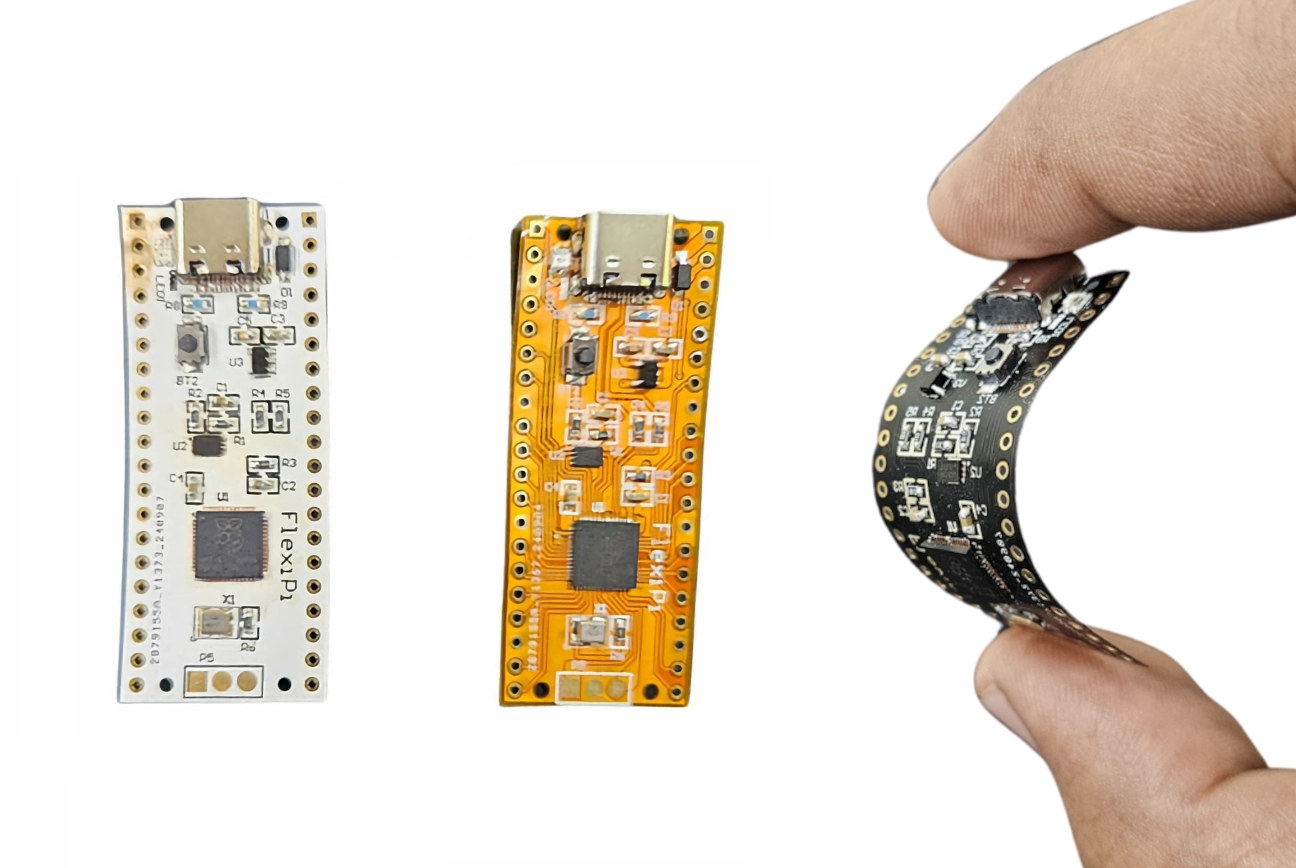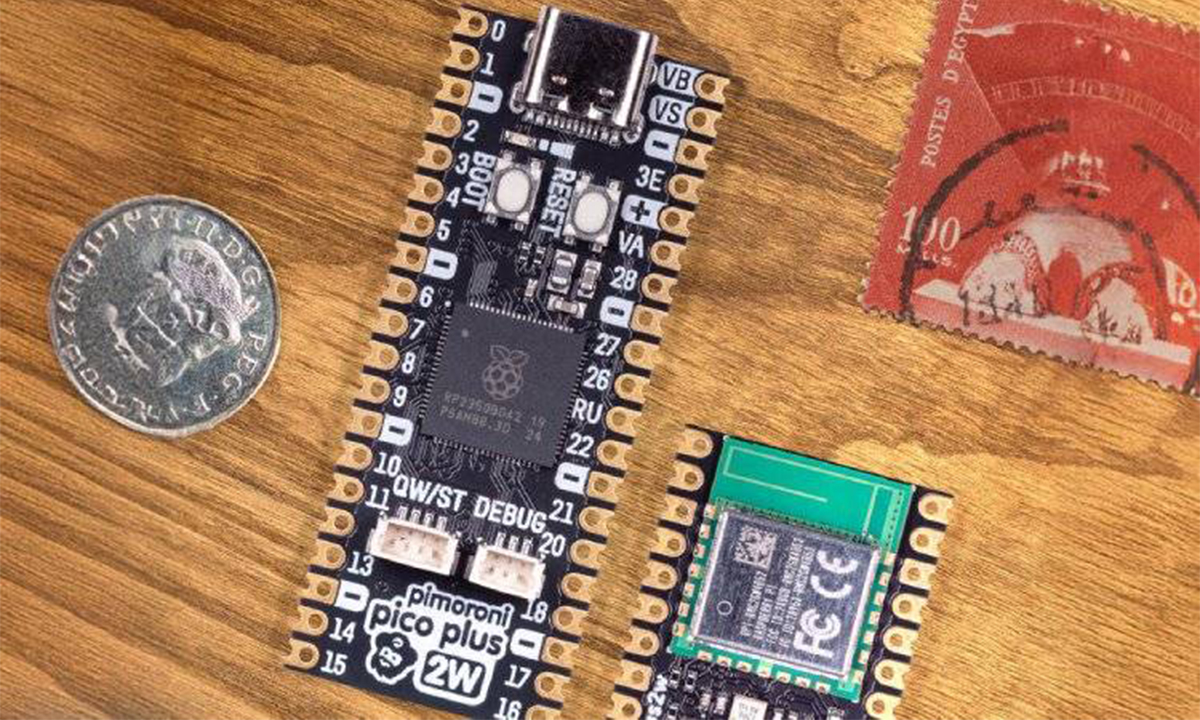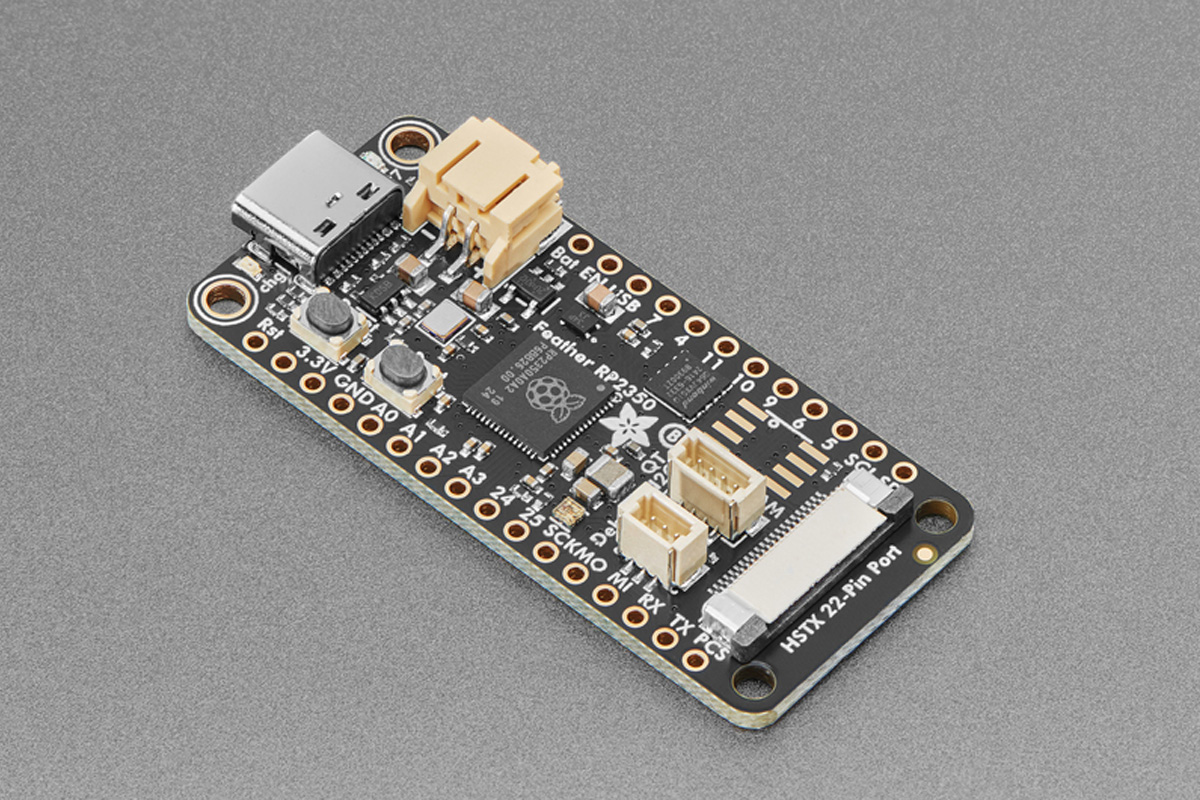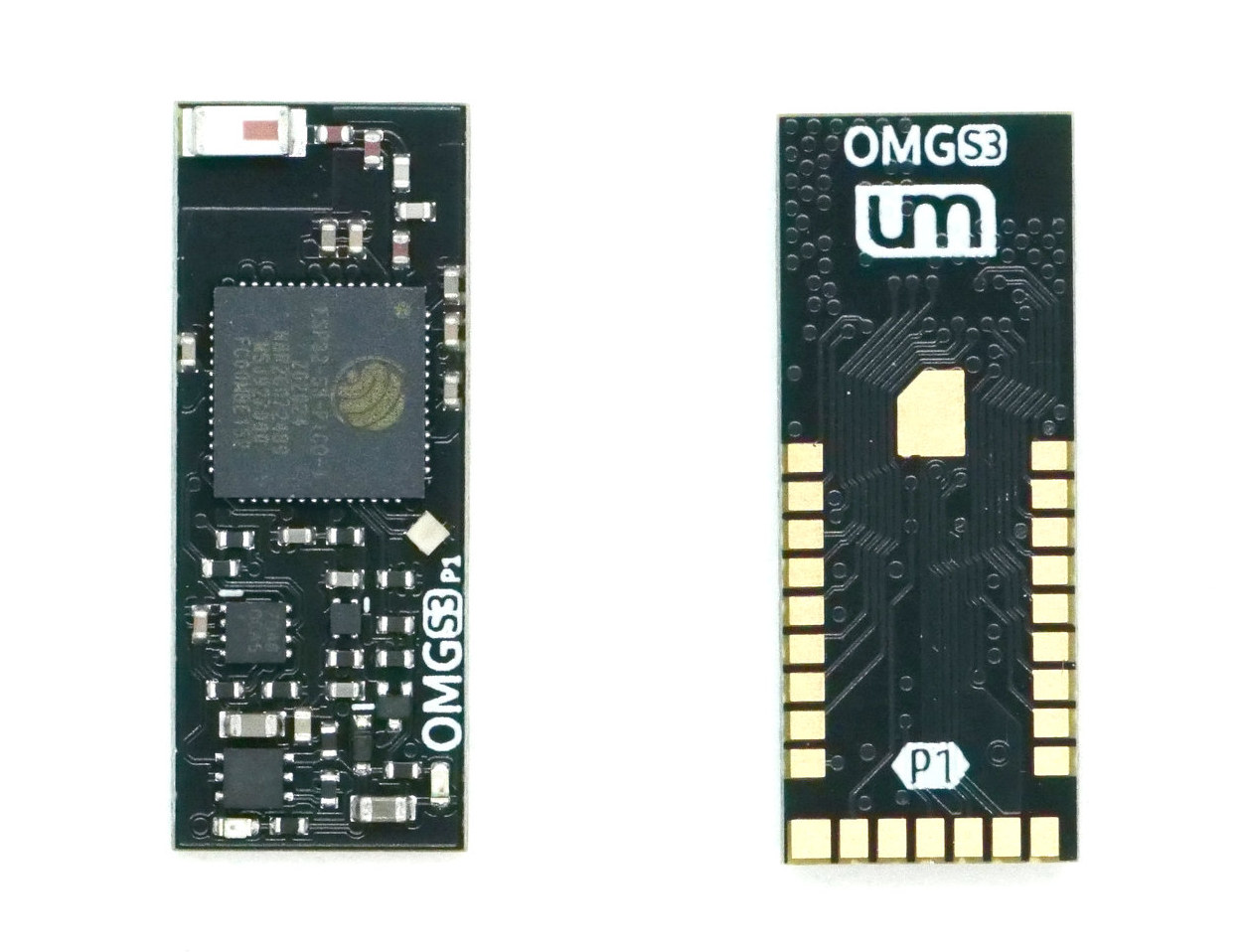SPOKE is a Raspberry Pi RP2040-based capacitive touch sensor board for interactive computer interfaces. It is designed to simplify the integration of touch-based control into various projects. SPOKE features up to 27 sensor inputs and can “turn almost any conductive material into a sensor” to control almost any computer input. Potential applications include music making, video game controlling, typing, and general software controlling. The board was designed by Tom Fox, an educator, maker, and musician in the UK. According to him, the board is accessible to beginners getting started with touch sensing while retaining enough power and customizability for professional use. It works with several conductive materials, including copper pipes, conductive paint, aluminum foil, pencils, conductive filaments, fruits, fabrics with conductive threads, and metallic surfaces. It can also be used with a non-conductive material (such as plywood) if a conductive material (e.g. tinfoil) is behind it. The fully-featured SPOKE capacitive […]
CPico RP2350 is another Raspberry Pi Pico 2 alternative with USB-C, 8MB flash, 2MB PSRAM, BConnect I2C & debug ports
iLabs CPico RP2350 is a Raspberry Pi Pico 2 alternative with the same form factor, still based on the Raspberry Pi RP2350 microcontroller but equipped with a USB-C port, 8MB flash, 2MB PSRAM, a Reset button, and Bconnect I2C and debug ports. Apart from that, the CPico RP2350 retains the other features of the Raspberry Pi Pico 2 including the two 20-pin PGIO headers, and BOOT button. It joins other Raspberry Pi Pico 2 alternatives like the Waveshare RP2350-Plus adding battery support. CPico RP2350 specifications: SoC – Raspberry Pi RP2350 CPU Dual-core Arm Cortex-M33 @ 150 MHz with Arm Trustzone, Secure boot Dual-core RISC-V Hazard3 @ 150 MHz Up two cores can be used at any given time Memory – 520 KB on-chip SRAM Security 8KB of anti-fuse OTP for key storage Secure boot (Arm only) SHA-256 acceleration Hardware TRNG Fast glitch detectors Package – QFN-60 Memory – 2 MP […]
Pimoroni Interstate 75 W (RP2350) board is designed for HUB75 LED matrix panels
Pimoroni Interstate 75 W (RP2350) is an all-in-one RGB LED matrix driver board designed for HUB75 LED matrix panels commonly used in video walls, advertising displays, and creative signage. Built around a Raspberry Pi RP2350 chip this board also uses the Raspberry Pi’s CYW43439 module for Wi-Fi and Bluetooth and features user buttons, an RGB LED, and a Qw/ST connector for integration with Qwiic/STEMMA QT breakouts. The kit is compatible with various LED matrix sizes (32×32, 64×64, etc.) and comes in a starter kit with panels, cables, and magnetic feet for quick setup. All these features make this kit useful for applications including real-time data like bus times, air quality, or sensor outputs, dynamic signage, scrolling text, and more. Pimoroni Interstate 75 W (RP2350) specifications: SoC – Raspberry Pi RP2350A CPU Dual-core Arm Cortex-M33 @ 150 MHz with Arm Trust zone, Secure boot OR Dual-core RISC-V Hazard3 @ 150 MHz Up […]
Seeed Studio XIAO Plus series adds more GPIOs through castellated holes
In response to community feedback for more I/O options, Seeed Studio has recently launched the Seeed Studio XIAO Plus series with 23 castellated mounting pins (20 GPIOs, 3 power pins) and improved back solder points, improving compatibility with carrier boards for complex projects. The new series includes the XIAO ESP32S3 Plus, XIAO nRF52840 Plus, and XIAO nRF52840 Sense Plus which are direct upgrades of the XIAO ESP32S3, XIAO nRF52840 BLE, and XIAO nRF52840 Sense boards. The new design allows for easier assembly and scalable production, with double the I/O options. XIAO ESP32S3 Plus The Seeed Studio XIAO ESP32S3 Plus is a compact development board with a total of 23 pins on the board out of which 11 are through-hole GPIO pins 9 additional SMD castellations GPIO pins and 3 through-hole are power pins. The board is built around an ESP32-S3 MCU so it has 2.4GHz WiFi and BLE 5.0 connectivity. Other […]
RP2040 FlexiBoard is a bendable Raspberry Pi Pico clone made of flexible PCB (Crowdfunding)
[Update December 22: The project was previously called FlexiPi, but Raspberry Pi considered it infringed on its trademarks, so the name was changed to RP2040 FlexiBoard instead]. RP2040 FlexiBoard is a bendable Raspberry Pi RP2040 board made of flexible PCB with the same layout as the original Raspberry Pi Pico, but featuring a USB-C port instead of a micro USB port on the official board. This follows the Flexduino flex PCB clone of the Arduino UNO made by “EDISON SCIENCE CORNER”, but the smaller design of “TOP Gadgets” RP2040 FlexiBoard may make it potentially more useful since it could be inserted into tight or round enclosures. RP2040 FlexiBoard specifications: MCU – Raspberry Pi RP2040 dual-core Cortex-M0+ microcontroller @ 48 MHz (overclockable to 133 MHz) with 264KB SRAM Storage – 2MB QSPI flash USB – 1x USB Type-C 1.1 port used for power and programming Expansion 2x 20-pin 2.54mm pitch header […]
Pimoroni Pico Plus 2 W combines RP2350B MCU with Raspberry Pi RM2 Wi-Fi and Bluetooth module
Raspberry Pi released the Raspberry Pi Pico 2 a few months ago, featuring the new RP2350 chip. Despite several upgrades, it lacks wireless connectivity like Pico W. While there’s no official Raspberry Pi Pico 2 W yet, Pimoroni has developed an unofficial alternative, the Pimoroni Pico Plus 2 W, which integrates Wi-Fi and Bluetooth using a yet-to-be-formally-announced Raspberry Pi RM2 module and potentially set to appear in a future Pico 2W. The Pimoroni Pico Plus 2W board is powered by the Raspberry Pi RP2350B dual-core Arm Cortex-M33 microcontroller, features 16MB of QSPI flash with XiP support, 8MB of PSRAM, wireless connectivity, a USB Type-C port for power and data, and a Qwiic/STEMMA QT connector for breakout board integration. A few days ago, we covered the Pimoroni Explorer board, an electronic prototyping board built around the Raspberry Pi RP2350B chip. It features a 2.8-inch LCD screen, a speaker connector, and multiple […]
Adafruit Feather RP2350 board with HSTX port enables video output and display interfaces
“Adafruit Feather RP2350 with HSTX port” is a Raspberry Pi RP2350 MCU development board that features an onboard 22-pin high-speed serial transmit interface (HSTX) port. The board also features a built-in 200mA+ LiPo charger, an RGB LED, a STEMMA QT connector, and a USB Type-C port for power and programming. The board is compatible with FeatherWings and supports development with various programming languages. These features make this board suitable for a wide range of applications, from embedded projects and IoT devices to educational purposes and prototyping. Previously we have covered a variety of RP2350-powered development boards, including the MOTION 2350 Pro, designed for robotics and motor control; the Solder Party’s RP2350 Stamp, ideal for space-constrained applications; and the WIZnet Raspberry Pi RP2350 boards designed for IoT and internet-connected applications. Feel free to check those out if you want to take a look at some of the unique development boards. Adafruit […]
ESP32-S3-PICO-based OMGS3 is the world’s smallest fully-featured ESP32-S3 module/board
Based on the ESP32-S3-PICO system-in-package (SiP), Unexpected Maker OMGS3 is a small, yet full-featured ESP32-S3 module/board whose designer claims is the world’s smallest in its category at just 25x10mm in size. It replaces the earlier Unexpected Maker NanoS3 based on the ESP32-S3FN8 SoC measuring 28 x 11 mm. The OMGS3’s ESP32-S3-PICO SiP integrates a dual-core ESP32-S3 WiFi and BLE wireless SoC, 8MB QSPI flash, and 2MB QSPI PSRAM. The board itself also includes a 3D antenna, an RGB LED, two LEDs for power and charging, and I/Os are exposed through 26 solder pads. Unexpected Maker OMGS3 specifications: SiP – Espressif ESP32-S3-PICO SoC ESP32-S3 dual-core Tensilica LX7 up to 240 MHz with 512KB SRAM, 16 KB RTC SRAM Wireless – WiFi 4 and Bluetooth 5 LE + Mesh Memory – 2MB QSPI PSRAM Storage – 8MB QSPI flash Antenna – High-gain 3D antenna I/Os via 26x solder pads Up to 17x GPIO […]


